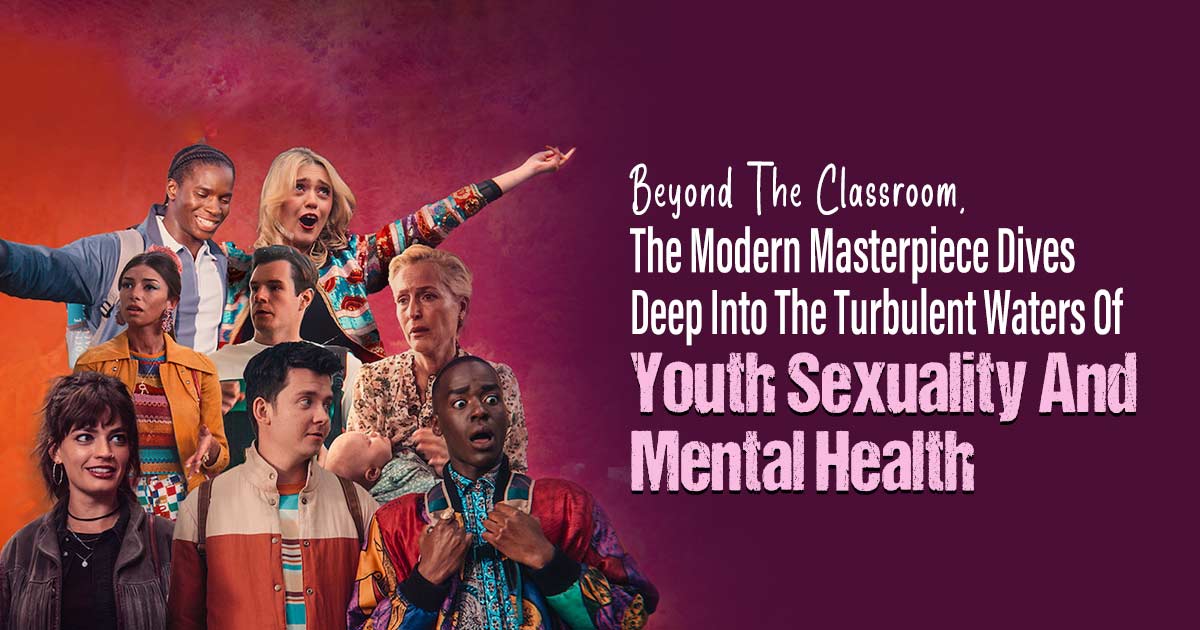In a world full of adult TV shows and movies, Netflix’s Sex Education boldly stands out as a modern masterpiece that redefined the genre. This British drama, created by Laurie Nunn, has delighted audiences around the world with its unique blend of humor, heartfelt storytelling, and unflinching examination of adolescent sexuality and mental health.
At the heart of Netflix’s Sex Education is a diverse and complex cast of characters that evolve significantly over the course of the series, making it accessible to viewers of various ages. The main character, Otis Milburn, played by Asa Butterfield, epitomizes the awkward but intelligent teenager who struggles with sexual insecurities.
His transformational journey from sexual ignorance to trusted sex advice guru is a compelling story that reflects the experiences of countless young people navigating their sexual awakening. Otis’ relatable struggles and his personal growth make him a fascinating and lovable character.
Maeve Wylie, played by Emma Mackey, is another standout character whose troubled background, ambition, and vulnerability resonate with audiences. Her friendship with Otis serves as the emotional core of the series, emphasizing the importance of platonic and romantic relationships in adolescence. The dynamic between Otis and Maeve illuminates the complexities of teenage friendship and the transformative power of true connection.
The ensemble cast, including Eric, Amy, Jackson, and many other characters, adds depth and verisimilitude to the story. These characters tackle a wide range of topics, from LGBTQ+ experiences and racial diversity to body image and mental health issues. Through its diverse cast of characters, Netflix’s Sex Education allows viewers to empathize with the struggles and triumphs of young people from diverse backgrounds, fostering a sense of belonging and understanding.
Netflix’s Sex Education lives up to its title and fearlessly tackles one of the most fundamental aspects of adolescence: sexuality. Laurie Nunn’s series explores this theme with nuance, humor, and sensitivity that sets it apart from other coming-of-age films. The show recognizes that young people are curious about sex, are often confused and need advice.
A hallmark of sex education is its willingness to engage with explicit content and use it as a vehicle for meaningful discussions about consent, communication, and self-acceptance. Otis’ role as a student sexual counselor provides a unique perspective for the series to explore sexual issues. The production emphasizes the importance of open communication, consent, and understanding in sexual relationships, allowing both characters and viewers to navigate this aspect of life with maturity and empathy.
One of Netflix’s Sex Education’s most important strengths is its commitment to addressing current social issues. The series seamlessly incorporates important themes such as LGBTQ+ acceptance, feminism, gender identity, and mental health into its stories. Rather than being superficial additions, these themes are deeply embedded in the characters’ stories and contribute to their growth and development.
For example, Eric Effiong, played by Ncuti Gatwa, embodies the series’ progressive themes. Eric’s journey as a gay teenager struggling with his identity, love life, and acceptance from his family and peers is portrayed with authenticity and sensitivity. Sex Education not only confronts the challenges Eric encounters but also commemorates his strength and journey of self-discovery, delivering a profound message of hope and inclusivity.
Additionally, the show challenges traditional gender roles and stereotypes by presenting strong and independent female characters who are uncompromising. Characters like Maeve Wiley subvert stereotypes by embodying sharp, entrepreneurial, and complex personalities who refuse to conform to society’s expectations, and tackle themes of slut-shaming and body image.
Neflix’s Sex Education deals with serious and sensitive topics, but manages to balance them out with great humor. In addition to being clever, the show’s humor serves as a mechanism to humanize the characters and allow viewers to empathize with their experiences. The awkwardness of youth, including dating, friendships, and family relationships, is portrayed with the perfect blend of humor and authenticity.
The show’s humor is complemented by its ability to create moments of genuine emotion and connection. These heartwarming moments deeply touch the viewer and make them feel like they are a part of the characters’ lives. Whether it’s the relationship between Otis and his mother, Jean Milburn, or the development of a friendship between the main characters, the series constantly reminds us of the importance of compassion, empathy, and understanding in our own lives.
Netflix’s Sex Education has transcended the confines of a typical coming-of-age series to become a masterpiece of modern television. Through complex, relatable characters, a fearless exploration of teenage sexuality, progressive themes, humor, and heartfelt moments, the series engages young people in a way that resonates with viewers of all ages. captures the essence of With its outstanding performances and direction, this work is in a class of its own, cementing its place as the best youth series of all time.
Laurie Nunn’s work is a poignant reminder that understanding, empathy, and open communication are essential parts of the adolescent journey, and she does so with unparalleled brilliance. Netflix’s Sex Education continues to pave the way for a more inclusive and authentic portrayal of teenage life and remains a beacon of hope and empowerment for young people and their parents alike.




























